10 Best FREE Apps For Starting A Small Business
The apps on this list operate on what is known as the “freemium model”. This is a business model that offers basic features to users at no cost and charges a premium for advanced features. Companies using a freemium model often offer a “free trial” of their premium subscriptions in the hopes the user will eventually elect to use the paid subscription.
Canva
Canva is graphic design platform used to create social media graphics, presentations, posters, documents and other visual content. Founded in 2013 in Perth, Australia, Canva had over 750,000 users by the end of this first year. Users of the site can create their own content, using templates already designed by Canva.
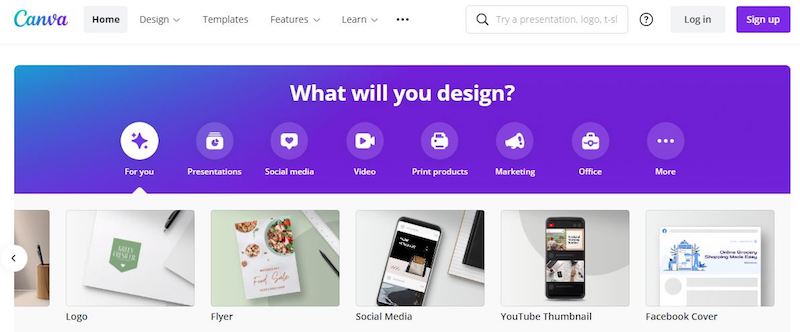
Much like the like other apps we will mention in this list, Canva offers a paid subscription called Canva Pro. Depending on the size of your team, prices can be anywhere from $119.99/year to $2,819.99/year for Canva Pro. The Pro version offers everything the free version does, plus some extra functions:
- Ability to remove backgrounds on images
- Magic Resize: Allows you to create one design and resize it to the correct format for social media and printing
- Brand Kit: Allows you to upload logos, fonts and colors and apply them to all templates for brand consistency
Using a design platform like Canva can help your startup business create the right logo and branding to get your business off the ground.
Notion
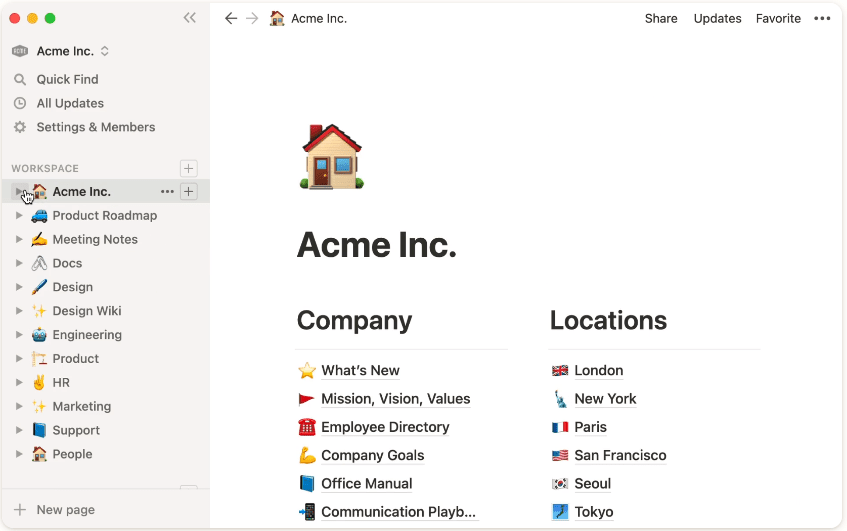 Notion is a platform that provides businesses with notes, databases, kanban boards, wikis, calendars and reminders. Founded in 2016 by Notion Labs Inc, a startup business in San Francisco, it did not become popular until 2019. It was founded on the idea of creating an “all-in-one workspace”. Essentially, Notion is a file management tool.
Notion is a platform that provides businesses with notes, databases, kanban boards, wikis, calendars and reminders. Founded in 2016 by Notion Labs Inc, a startup business in San Francisco, it did not become popular until 2019. It was founded on the idea of creating an “all-in-one workspace”. Essentially, Notion is a file management tool.
Notion has a four-tier subscription model: free, personal, team, and enterprise. The personal subscription is $4/month and offers everything the free subscription does, but includes unlimited file uploads and unlimited “guests”. The team subscription is $8/month and offers unlimited team members, a collaborative workspace, sharing permissions and admin tools.
Zoom
Over the past year and a half most of us have become quite familiar with Zoom. We have also been accustomed to having to restart a video call after forty minutes. Zoom was originally founded in 2011, but did not take off until early 2020. The free version of Zoom allows you to have up to 100 participants in a call, with the aforementioned forty minute time limit. It also allows you to have unlimited one-on-one meetings up to thirty minutes.
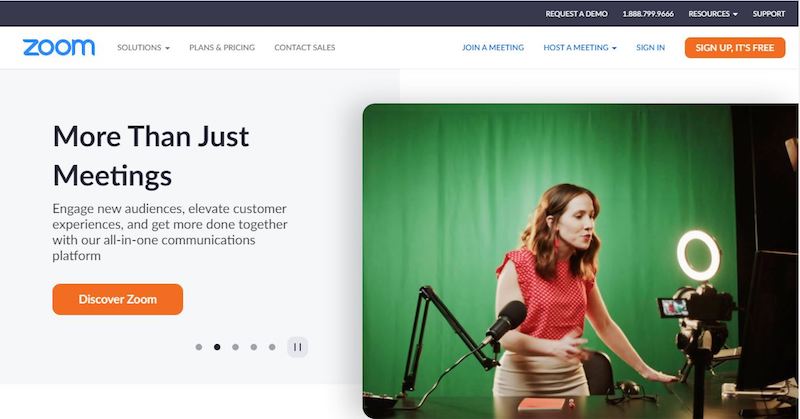
If your small business opts for Zoom’s “Pro” subscription, it is $14.99/month. The Pro plan allows you to have up to 1000 participants, group meetings up to thirty hours long, stream the call on social media and add 1GB of cloud storage for recordings. They also have a “Small Business” subscription which is $19.99/month and includes everything the Pro plan does, plus recording transcripts, managed domains and company branding.
Dropbox
Founded in 2007 by MIT student Drew Houston, 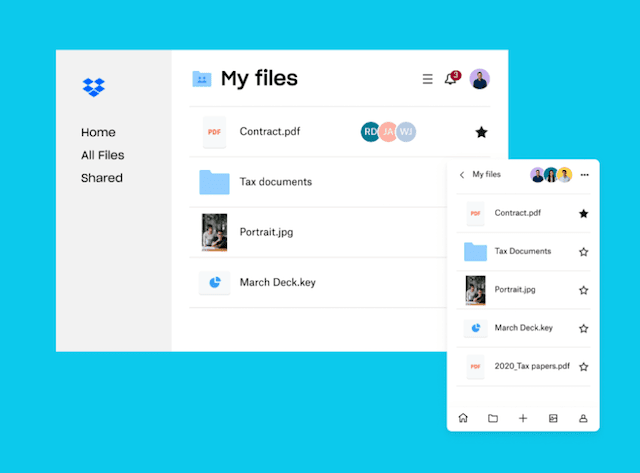 Dropbox has become one of the largest file management services in the world. Houston conceived the concept of Dropbox after repeatedly forgetting his flash drive while he was a student at MIT. As of April, 2021 Dropbox has over 700 million registered users.
Dropbox has become one of the largest file management services in the world. Houston conceived the concept of Dropbox after repeatedly forgetting his flash drive while he was a student at MIT. As of April, 2021 Dropbox has over 700 million registered users.
The free version of Dropbox offers up to 2GB of file storage. It allows you to send links where people can store or access information that would otherwise be too large to send in an email. Dropbox also allows you to automatically backup your entire website and is an integrated backup solution for other software suites.
Dropbox has over 15 million paying users, and offers three different paid subscriptions: professional, standard, and advanced.
- Professional: $16.58/month and up to 3,000GB of storage for a single user
- Standard: $12.50/month per user and up to 5,000GB of storage for three or more users
- Advanced: $20/month per user and unlimited storage for three or more users
Google Docs
Google Docs is an online word processor provided by the tech giant Google. Originally released in 2006, Google Docs is now a part of Google’s G Suite, which has over 2 billion users. Google Docs offers a word processing program, a slideshow builder (Google Slides), a spreadsheet builder (Google Sheets) and a survey builder (Google Forms). These programs are all free to use for anyone who has a Google account.

Google Docs is included with Google Workspace, which is a an all-in-one business platform offered by Google. Subscriptions start at $6/month and includes Google Docs, as well as other features:
- Gmail
- Google Drive (storage)
- Calendar
- Chat
- Sites
- Meet (video conferencing)
PayPal
Founded in 1998 by Elon Musk and a handful of other investors, PayPal has become one of the biggest financial technology companies in the world. PayPal’s main functions are supporting online money transfers and payment processing for online vendors and auction sites. It offers personal and business accounts, which are both free to sign up for.
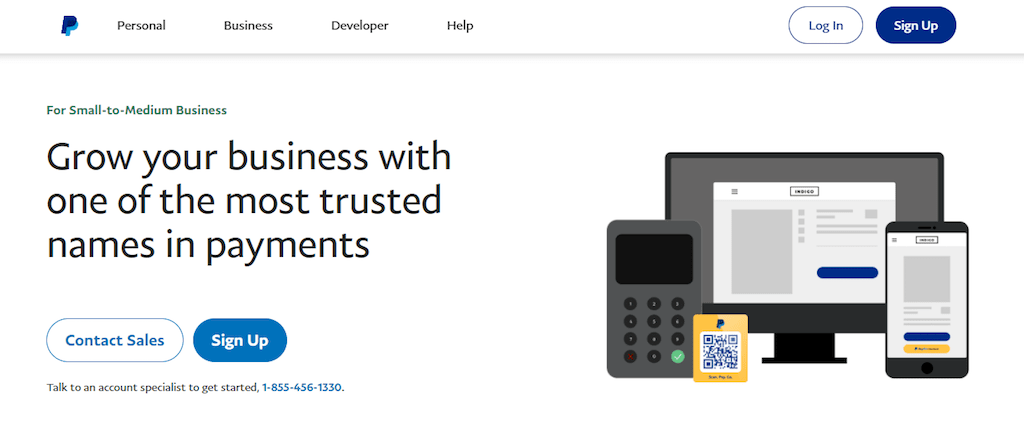
While a business account is free to have, PayPal does charge your small business 2.9% of each payment you received, plus an additional 30 cents per transaction. Additionally, PayPal will often hold funds for 72 hours before they are transferred to your account. With the personal account, you do not have the ability to use PayPal as a payment processing tool.
Trello
Trello, which is derived from the word ‘trellis’, is a another kanban-style list-making application. It was founded in 2011 by software engineers Joel Spolsky and Michael Pryor. Users create task boards with different columns and move the tasks between them. The columns are typically To Do, Doing, and Done. This allows your small business to easily organize and understand and where in the process a certain task is.
Trello is often used by businesses who employee virtual assistants (VA), as both they and their VA can see in real-time what needs to be done.
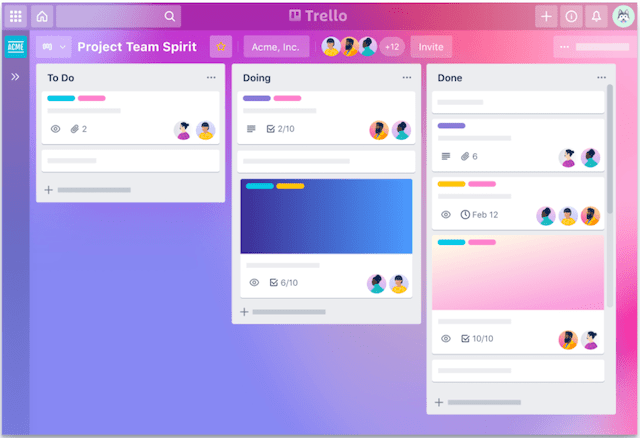 Trello offers two paid versions of their platform: standard and premium. The standard subscription, much like the other apps on this list, includes everything that the free version does, plus some additional functions. The premium plan adds more functionality for $10/month, and this subscription offers a free trial to first time users.
Trello offers two paid versions of their platform: standard and premium. The standard subscription, much like the other apps on this list, includes everything that the free version does, plus some additional functions. The premium plan adds more functionality for $10/month, and this subscription offers a free trial to first time users.
Trello can be particularly helpful to those with a startup business because it allows you to organize and manage tasks as you grow your small business.
Wave
The only Canadian app to make this list, Wave is a financial service and software company founded in 2011. Initially they started as a free online accounting software service, but in 2012 began branching into financial services like credit card and payment processing.
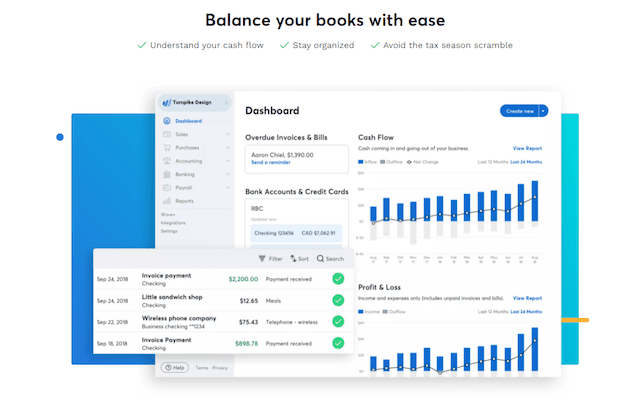 Wave’s accounting service is their most widely used feature. Wave accounting offers a plethora of features including:
Wave’s accounting service is their most widely used feature. Wave accounting offers a plethora of features including:
- Unlimited bank and credit card connections
- Unlimited income and expense tracking
- Unlimited customizable invoicing and receipt uploads per month
- Bill and invoice reminders
Wave also offers invoicing for free, making it easy for you to track what has been paid, and still needs to be paid. For many startup business, keeping track of spending can be difficult. Wave’s invoicing service can help you manage your spending and focus on growing your business.
Their accounting and invoicing services are still free, but similar to PayPal, they charge for their credit card and payment processing service:
Credit Card Process: 2.9% plus 30 cents per transaction for Visa, MasterCard and Discover. 3.4% plus 30 cents per transaction for American Expres
Bank Payments: 1% per transaction ($1 minimum fee)
Wave also offers a monthly payroll service which is $35/month, plus $6 per active employee, plus $6 per independent contractor paid.
Mailchimp
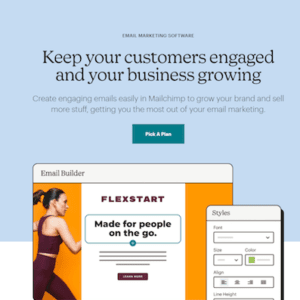 Founded in 2001, Mailchimp is a marketing automation platform and email marketing service. Its main functions are to help businesses manage their mailing lists and create email marketing campaigns and automations to send to customers.
Founded in 2001, Mailchimp is a marketing automation platform and email marketing service. Its main functions are to help businesses manage their mailing lists and create email marketing campaigns and automations to send to customers.
The free version of Mailchimp includes marketing customer relationship management (CRM), creative assistants, landing pages and basic email templates. For $9.99/month you can upgrade to the ‘Essentials’ subscription. This adds free custom branding, A/B testing and 24/7 email and chat support.
Zoho CRM
Zoho CRM is a customer relationship management service offered by Indian based online office suite, Zoho. Originally founded in 2005 as a web-based word processor, Zoho has branched out to offer many services similar to those of Google. 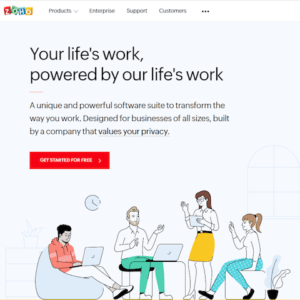 You can actually find Zoho CRM on the Google Workspace Marketplace, and it allows you to bring all your emails, files, calendar appointments and tasks together in one place. However, Google and Zoho remain separate, competing companies.
You can actually find Zoho CRM on the Google Workspace Marketplace, and it allows you to bring all your emails, files, calendar appointments and tasks together in one place. However, Google and Zoho remain separate, competing companies.
There are five different subscription levels to Zoho CRM: free, standard ($14/user/month), professional ($23/user/month), enterprise ($40/user/month), and ultimate ($52/user/month). According to PCmag, Zoho CRM is the top rated CRM software on the market today.
In Conclusion
Whether you’re a startup business, or looking to grow your current business, using technology and automation can help your small business continue to grow. If these apps don’t sound right for you, we offer startup and growth consulting services to help you pick the right software for your small business. If you have any questions regarding business operations, please contact us at North Consulting Services.

